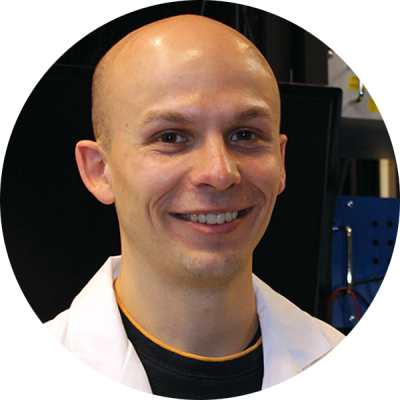
Kyle Severson
Touch is an intrinsically active sense. As humans primarily use our hands to actively gather tactile information, mice use their whiskers to explore their environment. Leveraging the mouse whisker system as a model for active touch, we focused on understanding the mechanical sensitivity of a type of touch receptor called the Merkel cell-neurite complex. Employing optogenetics, electrophysiology and mechanical models, we found that these touch receptor neurons reliably encode features of both object touch and whisker position.
This remarkable mechanical sensitivity supports the Merkel cell-neurite complex’s hypothesized role in perception of object shape. Furthermore, this work adds evidence that we should model touch and proprioception, the sense of body position, within a unified mechanical framework. These models could be particularly important for our basic understanding of touch perception, as well as engineering touch and proprioceptive feedback in prosthetics and robotics.
Questions & Answers
Why did you choose Johns Hopkins for your work?
I chose to do my thesis work at Johns Hopkins because of the rich collaboration among many successful faculty members, fellows and students. Researchers at all stages of their careers work together as peers to answer interesting scientific questions. Furthermore, the Department of Neuroscience is like a family who is always there to support you, whether or not you think you need it.
What does receiving this award mean to you personally and professionally? Do you have any connection with the particular award you received?
This award is recognition of the hard work I put into my research. Future mentors will see that Johns Hopkins faculty highlighted my scientific contributions. I am honored to be among my friends and other outstanding colleagues who were also lucky enough to win an award at Young Investigators’ Day.
What contributed to your project’s success (special skills, interests, opportunities, guidance, etc.)?
I was incredibly fortunate to work under the mentorship of Dan O’Connor. He trained me to always collect high quality data, even when experiments were particularly demanding. I was also fortunate to work alongside many talented graduate students and postdocs in my lab area and across Johns Hopkins. Duo Xu worked exceptionally hard on the computational aspects of my project. I also owe special thanks to Ling Bai in David Ginty’s lab, whose genetics expertise added considerable value to this project.
What thoughts do you have about Young Investigators’ Day itself, as a celebration of the roles students and fellows play in research at Johns Hopkins?
This award is a testament to Johns Hopkins’ appreciation for students and postdocs. Trainees are the lifeblood of research universities. I believe that our fresh eyes and stubborn determination are critical to drive new discoveries.
What has been your best/most memorable experience while at Johns Hopkins?
My most memorable experiences were dinners with fellow foodies in my program. We have enjoyed cooking dishes together and eating at restaurants in Baltimore, D.C., and at the Society for Neuroscience meetings.
What are your plans over the next year or so?
Over the following year, I plan to graduate and start a postdoc. I hope to continue researching questions related to touch perception. With the time I have left at Johns Hopkins, I intend to finish a couple exciting projects and pass on this line of work to the next generation of students and postdocs in the O’Connor lab.
Tell us something interesting about yourself that makes you unique. Do you have any special hobbies, interests or life experiences?
In my free time, I enjoy playing soccer with my teammates in the Baltimore recreational leagues.